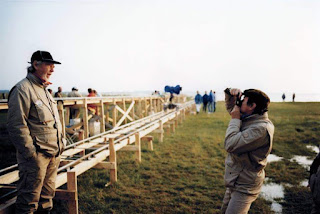The French Dispatch [2021] - Wes Anderson's hyper-specific nostalgia is beautiful to look at but is very removed from emotional resonance
Name - The French Dispatch
Director - Wes Anderson
Runtime - 108 mins
The one thing you cannot fault Wes Anderson for is his sense of visual style and symmetry. His frames are manicured, almost diorama like in its symmetry, and that's a style that has been honed after years of crafting it through his whimsical and eclectic filmography.
So it makes sense that a man following a hyper specific sense of style would make a movie which is a loving ode to The New Yorker, an idiosyncratic, whimsical magazine with stories, comic strips, articles etc. I have read one or two issues of The New Yorker, in its modern iteration, but looking at The French Dispatch, and how it is structured, there is almost an obsessive sense to recreate the feeling of getting the larger sized length magazine, luxuriating on the lingue claire lined artwork of the cover, and slowly perusing through and getting lost in it. I clarify that I haven't experienced this feeling of perusing The New Yorker myself, but that is definitely what Anderson is trying to articulate here.
This feeling, which Anderson wants the viewer to experience, is such a hyper-specific form of nostalgia that it could be alienating to some, or completely dismissive to a section of the viewers. However in constructing the movie like the final issue of a prestigious eclectic and dare I say pretentious magazine, Anderson crafts an anthology movie with three different stories and three different and separate tones, but underlying common sense of vibe of a whimsical nature - and thus is created an anthology movie.
But like any anthology, all of the constituents don't hit in the exact same way. Like The New Yorker, no two stories or no two comic strips will evoke that same form of emotion. The French Dispatch too suffers from that same sense of uneven-ness - if the almost Jacques Tati like story of an incarcerated artist and his muse who is a female prison guard is balanced perfectly like a well made souffle, then the almost Godard-ian structured story of the young naive protesters completely enamored in creating a manifesto feels too simplistic and surface level, like a delectable apple pie which looks great, but ultimately tastes rubbery and lukewarm. If the food metaphors are hitting you too hard while reading this review, that is intentional, because in the third short Anderson juxtaposes wonderful colorful shorts of desserts with the planning of an almost military raid by a police commissioner to rescue his precocious son from a group of kidnappers - a climactic act of the third short starring Jeffrey Wright which is also arguably the best short in this eclectic package. Even if you discount the absolutely delightful and idiosyncratic segment of Owen Wilson on a bicycle traveling around the city exploring and recounting the viewers of the past and present of Kansas, at the end of the day The French Dispatch is Anderson at his finest technically, but also the least emotionally involved.
Its not to say that his being removed or keeping the viewers at an arms length from the events happening on screen, isn't helping evoking the feeling of reading one of the chief sections of The French Dispatch, because it does. But at the end of the day, barring a few moments of poignancy from Benicio Del Toro as the prisoner artist in the first segment or Stephen Park as Lieutenant Nescaffier, the chief subject of the third short but who ultimately gets a line or two to speak in the end, there aren't many such moments of connection with the viewer. There isn't the melancholy, or the whimsy or the feeling of relatability in idiosyncrasy which you would have experienced while watching The Royal Tenenbaums or The Grand Budapest Hotel. It would be a cliche to say that like European comics with their lingue claire art, The French Dispatch is too meticulously crafted on the technical side, but like European comics which evokes a sense of wonder or joy or warmth, that is somewhat lacking here. Alexandre Desplat's score is the best so far, and easily one of the brightest spots of this movie.
However the movie does work as an intricate and yet loving ode to journalism. The one line which Bill Murray's character Arthur Howitzer Jr., editor of The French Dispatch says is the one that struck me as the hardest - "Try to make it sound like you wrote it that way on purpose". This movie gets me as a writer. I only wish it got me more as a Wes Anderson movie lover.
Rating - ⭐⭐⭐.5/5
The French Dispatch is currently available in Digital and VOD








Comments
Post a Comment